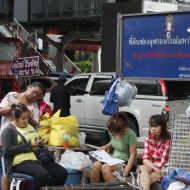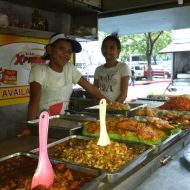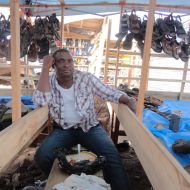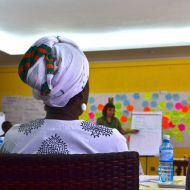Illegal Brews in Slum-Based Bars Make Nairobians Tipsy, Blind or Dead
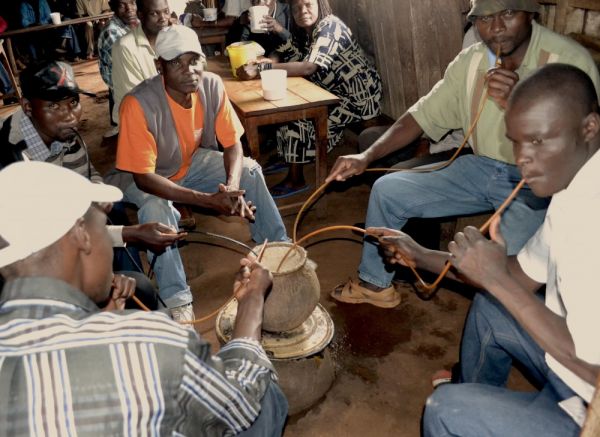
Alcoholic drinks are rapidly gaining popularity among the city’s slum residents, but it’s the additives that are now being mixed in with them that’s the main concern. Photo credit: Sam Sturgis
“You’re going to have to drink whatever they give you to prove you’re not a snitch.”
That’s the text message I receive before making my way to Kangemi, a densely populated informal settlement located along the trash-strewn Nairobi River. My mind begins to race. The rumors I’ve been told about Nairobi’s informal brews are outlandish, and very few of the anecdotes about their effects end well. Now that my contact is telling me I’m going to have to down a few glasses of the homemade concoctions to prove I’m not a narc, my curiosity begins to transform into a flight instinct.
Changaa and busaa – two of the most popular alcoholic brews cooked in Nairobi’s slums – are notorious. “You either go blind because of the chemicals or you won’t be able to stop vomiting,” was one description I was given by someone who’d tried them. It’s not uncommon to wake up to stories in the morning newspaper blithely reporting on yet another slum dweller who’d been killed by the cheap blend of fermented wheat, sorghum, millet and water.
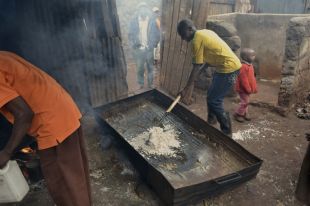
A man spreads sorghum, which will be cooked and then fermented before being put into the busaa. Photo credit: Sam Sturgis
The alcoholic drinks are rapidly gaining popularity among the city’s slum residents, but that’s not the main concern – rather, it’s the additives that are now being mixed in with them. In fact, many of the “local brews,” as they’re called, have histories much longer than the slums themselves. Nearly all of Kenya’s 42 tribes have their own unique alcoholic beverage that is brewed informally and consumed on behalf of one’s ethnic identity.
More recently, however, due to inflationary wheat and water prices, the slum-based bars have begun to substitute lethal chemicals like gasoline and acid waste for the traditional ingredients. Impoverished and alcohol-addicted informal residents have little option but to (sometimes unknowingly) consume the toxic cocktails anyway. And despite ongoing police raids, the informal pubs found in each of Nairobi’s slums continue to offer a drinkable game of Russian roulette to thirsty slum-dwellers willing to take the chance.
Besides the smoke billowing from the building’s open ceiling, the informal bar I’m brought to looks identical from the outside to the shanty homes all around it. The only other giveaway is the occasional man stumbling groggily out of the rusted and poorly constructed entryway. No doubt about it: This is one of Kangemi’s infamous busaa bars.
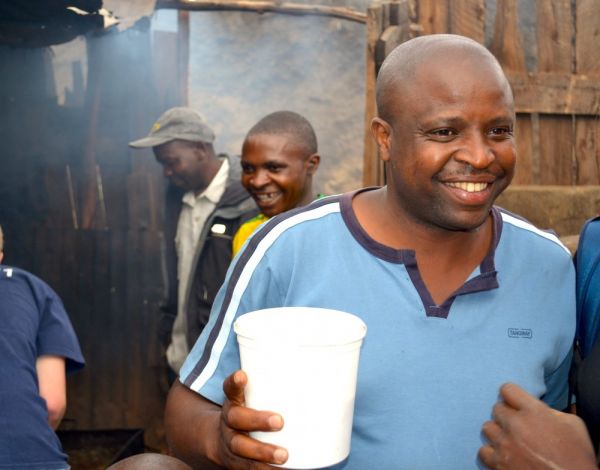
A man drinks changaa – known for containing lethal chemicals – from a cup. Behind him, bar workers cook up the next batch of informal brew. Photo credit: Sam Sturgis
“Business is booming,” boasts Martin Makokha, the owner of the bar. He says a bottle of beer costs a minimum of 100 Kenya shillings ($1.20 USD) while a glass of his informal brew is only 10 shillings (12 cents USD). He views his informal pub as the only option for residents of Kangemi who are looking for a drink. “Many people here live on only twenty shillings a day. How are they going to afford a Tusker?” he asks, referring to Nairobi’s popular local beer.
In his tightly pressed shirt, dress shoes and a large-face watch, Makokha looks every inch the successful businessman, regardless of the fact that we’re sitting in a shanty that serves an illegal drug. Much to my surprise, he shares stories about traveling to New Jersey and New York as we sit among a group of men sipping busaa through electrical cords (the straw of choice) from a cracked pot filled to the brim. A number of Makokha’s family and friends have immigrated to the U.S. for both education and work. The middle-aged bar owner, on the other hand, has found a comfortable living despite remaining in the slums. A maximum-capacity bar at two in the afternoon on a Monday, however, means that his profits still come largely illegally. But to Makokha, it’s the state that’s in the wrong, not he.
“We’re still fighting the Mututho laws,” he says, referring to former Parliamentarian John Mututho’s 2010 Alcoholic Drinks and Control Act, which put in place unprecedented regulations on Kenya’s alcohol sectors – both the formal and informal ones. For Makokha and other informal bar owners operating within Nairobi’s slums, the act has severely constrained their market. It confines their hours of operation to 5 to 11 p.m. during the week, and 2 to 11 p.m. on weekends. Because of these restrictions, Makokha feels he has no other option but to operate outside the rules.
“I’d say about 90 percent of my customers are security guards who work every night,” he says. “They’re flocking to the bar by 6 a.m.!” Rather than turn away thirsty men returning to the slum after guarding middle- to high-income apartments all night, Makokha keeps his establishment operating outside the permitted times through bribes.
“If twenty policemen show up over the course of the day I’m usually giving them up to 2,000 shillings ($24 USD),” he says.
With a business that requires little more than some jerricans filled with homemade brew and a few benches strewn about, bribing his way into a round-the-clock business provides Makokha enough revenue to keep his informal brew legit: No gasoline or acid waste in this quality product, he assures me.
“Other pubs use chemicals because they can’t afford the wheat prices. My stuff is completely clean,” he smiles, handing me a glass of the clear, room-temperature changaa.
It’s unbelievably strong. The initial sweetness of the distilled liquor quickly gives way to an unnatural bite that leaves my mouth desperate for water. Amused, the men sipping through the electrical cords laugh as I begin to cough. Nevertheless, I’ve still got my sight. Glad the bar owner was telling the truth.



